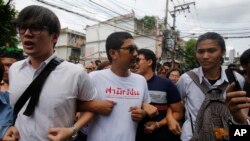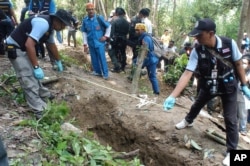Thailand is considering legislation aimed at criminalizing torture and other human rights abuses.
A draft law, to be presented to the National Legislative Assembly, hands down a range of sanctions, including prison sentences of up to 20 years to state officials convicted of committing torture, 30 year in prison if the torture leads to serious injury and life in prison if the victim dies.
The draft legislation accepted by the government has passed review by the Council of State.
Thailand has faced widespread criticism over human rights legislation and protection. A United Nations committee on enforced disappearances says little has been achieved concerning judicial accountability in cases of enforced disappearance.
The U.N.’s Working Group on Enforced or Involuntary Disappearances has recorded 82 cases of enforced disappearances in Thailand since 1980.
The judiciary has consistently failed to address cases of enforced disappearance, said National Human Rights Commissioner Angkhana Neelapaichit, whose husband, Muslim human rights lawyer, Somchai Neelapaichit, disappeared in March 2004.
“Over the last 12 years we heard a lot of cases of enforced disappearance in Thailand. But not even one case that can go through the court. Most of the victims’ families are scared and they do not want to speak [out],” Angkhana said.
“Somchai used to tell me that there’s a lot of cases of people in the South [of Thailand] that were abducted and disappeared. But we cannot do anything. He said we cannot do anything because they have no evidence,” she said.
In 2014, ethnic Karen activist Porlachee “Billy” Rakchongcharoen, investigating illegal timber trade in forests overseen by the National Parks, disappeared after encountering a senior national parks officer.
The officer said Billy had been released. But the senior parks official is under investigation over the activist’s disappearance, with a case being overseen by the Office of Public Sector Anti-Corruption Commission.
Billy’s wife, Pinnipa Preuksapan, called for an end to enforced disappearances by state officials as efforts to locate her husband had failed to uncover his whereabouts.
“I would like to ask the government and also the relevant agencies, please stop the cases of disappearance,” Pinnipa said through a translator.
Human Rights Watch’s deputy Asia director, Phil Robertson, said the cases of Somchai Neelapaichit and “Billy” Rakchongcharoen, highlight fears held by rights activists in facing powerful individuals in Thai society.
"The greatest fear of activists like lawyer Somchai and Karen community defender Billy is that an influential elite decides that they had enough and make the call to have them disappeared,” Robertson said in emailed comments to VOA.
“The fact that it is so easy to do is a chilling indicator of the failure of the rule of law where senior Thai government and security officials are involved," he said.
He said a key issue is a “pervasive culture of impunity in Thailand” that shields members of the rich and powerful ruling elite from laws others are compelled to obey.
But rights advocate and author Benjamin Zawacki said overcoming the climate of impunity is a major challenge in Thailand.
“In some ways Thai culture itself – long before the word impunity came into vogue in the human rights community in relation to human rights violations – it is simply a culture that by its nature does not hold people to account,” Zawacki said.
And despite government endorsement of the legislation, Thailand remains highly sensitive to criticism by rights advocates on the issue of alleged torture by security forces.
In September, the human rights group Amnesty International was prevented from releasing a report in Bangkok detailing torture “and other ill treatment” by police or security forces, in investigations against suspected insurgents, or government opponents.
The military sued several Thai rights advocates over reporting on rights abuses.
Charges of criminal defamation and computer related violations have been filed against several advocates.
Pornpen Khongkachonkiet, chair of Amnesty International in Thailand, along with Anchana Heemina and rights defender Somchai Homlaor, face charges after the release of a report detailing 54 cases of alleged torture by security forces in the Southern border provinces of Thailand. They face jail terms of up to seven years if convicted.
Thailand’s new legislation on enforced disappearance and torture, once enacted comes a decade after Thailand Ratified the U.N.’s Convention against Torture and other Cruel, Inhuman or Degrading Treatment or Punishment in 2007.





